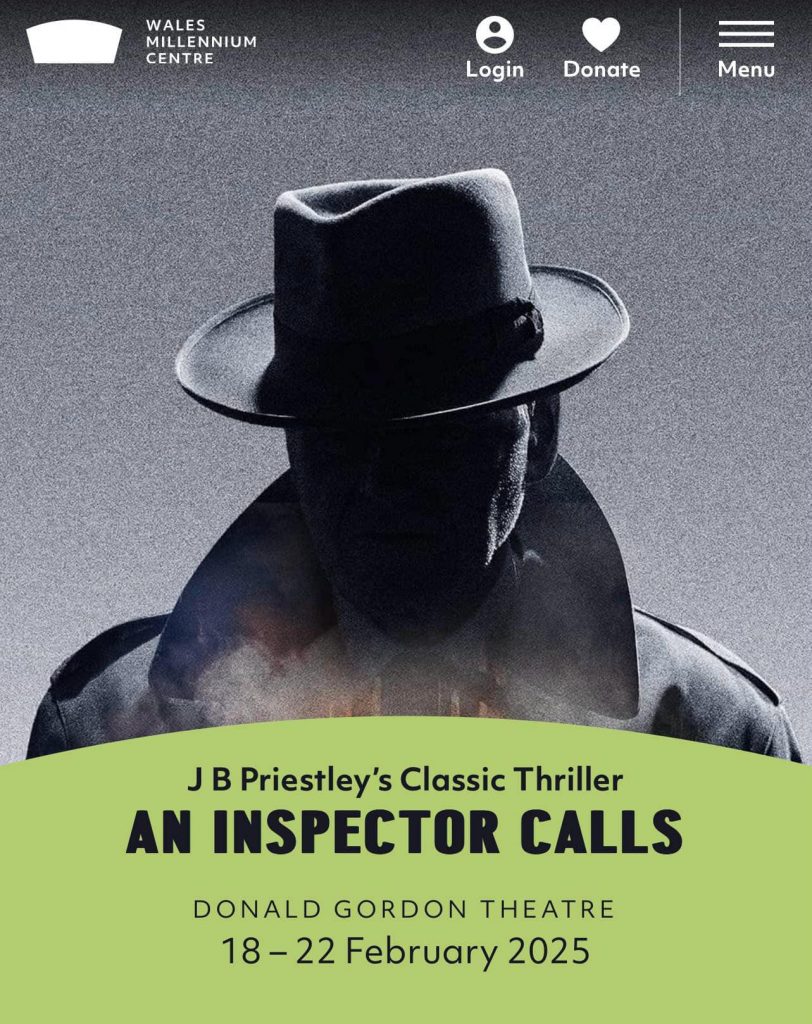Despite helping students to study An Inspector Calls for GCSE English Literature for about twelve years, reading the play many times and being completely in awe of JB Priestley’s genius in writing it, I had never had the opportunity to see it. When I heard that Stephen Daldry’s production of the play was coming to the Wales Millennium Centre’s Donald Gordon Theatre in February, I was determined not to miss it this time. Because our school wasn’t running a trip to see the production, I convinced my reluctant husband to join me.
For those not familiar with the play, here’s what was said about it on the Wales Millennium Centre’s website:
Stephen Daldry’s multi award-winning National Theatre production of JB Priestley’s classic thriller returns after a record-breaking, sell-out tour in 2022.
Winner of 19 major awards and hailed as the theatrical event of its generation, An Inspector Calls has thrilled more than 5 million theatregoers worldwide.
‘A work of great directorial daring, breathtaking visual invention and passionate moral urgency’ Daily Telegraph
When Inspector Goole arrives unexpectedly at the prosperous Birling family home, their peaceful dinner party is shattered by his investigations into the death of a young woman. His startling revelations shake the very foundations of their lives and challenge us all to examine our consciences.
More relevant now than ever, this is a must-see for a whole new generation
‘Spectacular. If you haven’t seen it, you must. If you have, see it again’ Mail on Sunday
‘A riveting examination of conscience and class.’ Sunday Express
I was able to secure tickets for the matinee performance on the Saturday afternoon, 22nd February. Since we have friends who live down the Bay, they reserved a parking space for us on their street. We arrived around noon, which gave us the opportunity to take a walk round the bay and spend some time with our friends, before heading to the Wales Millennium Centre. We even took a stroll through Wales’ only Tiny Forest.
Before the show commenced, we had a look at the merchandise and I bought a new pin for my lanyard, to add to my collection. We had great seats in the centre of the circle, which gave us a perfect view of the whole stage. Although written in three acts, there was no interval. This worked well, with the curtain lowering in-between acts.
I observed a few differences from Priestley’s original script and set, some of which I agreed with, others I questioned. From my observations, the production was mostly true to the original script but a few of Birling’s lines were cut. He made no reference to the Titanic, but this didn’t detract from the point Priestley was making through Birling’s character. I was, however, disappointed that, in the Inspector’s speech, he said, that we are all part of “one society”. I think this lost the emphasis of the original, “one body.”
The actor playing Shelia was a woman of colour. I thought this was a good way of making the play even more relevant to a twenty-first century audience. Furthermore, the Inspector was Welsh. This created a bit of humour for the mostly Welsh audience, especially since the actor was putting on a strong Valleys accent and changed a couple of the lines into Welsh: Diolch yn fawr and Nos da. In my opinion, Sybil was portrayed exactly how Priestly intended: selfish and loathsome. Nevertheless, the character that affected us the most was Eric. From reading the play, Eric comes across as a bit of a hopeless loser, but in this production, he had strength and conviction but was misunderstood and dismissed by his family. Eric’s portrayal brought both my husband and me to tears.
The most remarkable, ingenious aspect of Daldry’s production is the set, which is very different to Priestley’s original. The set is of a street of the period (1912) with the Birlings’ house, elevated, in the centre. It is notable that the Inspector never enters the house, to signify his non-acceptance of the Birlings. Without giving away the surprise, it is the set that amplifies Priestley’s message in the final Act.
A couple of other things to comment on were the Inspector appearing on the balcony at the start of Act Two and the smell of cigar smoke when Birling lights one in Act 3. I will end with the powerful addition of having Eva Smith on stage throughout the play. (Please don’t read on if you don’t want a little spoiler). Although on stage throughout all three acts, Eva Smith also doesn’t enter the Birlings’ house and only interacts with the Inspector, Sheila and Eric. And just before the final curtain, she seems to forgive Eric – a poignant reminder that none of us is beyond redemption.
My not-interested-in-English-literature husband was deeply moved by the play and is now asking what we can go to see next.

Leave a Reply